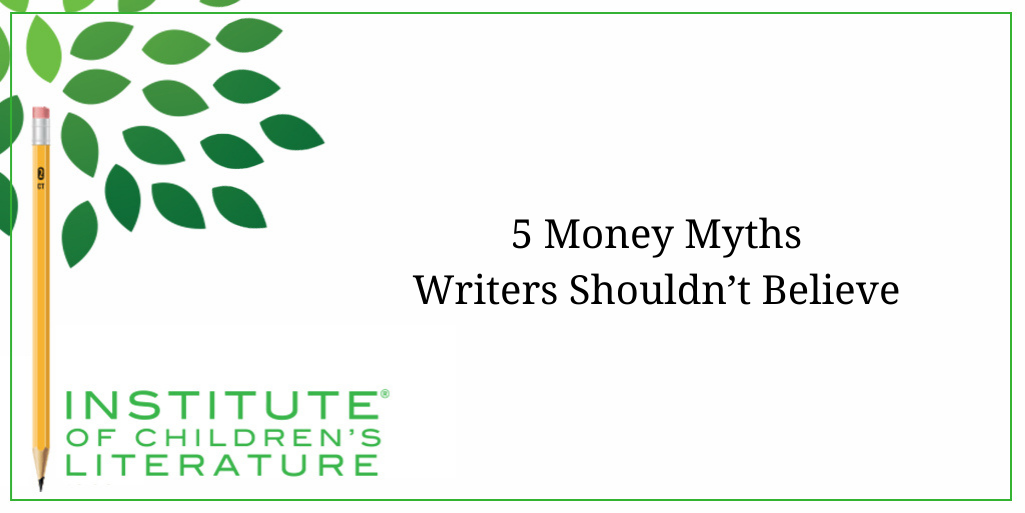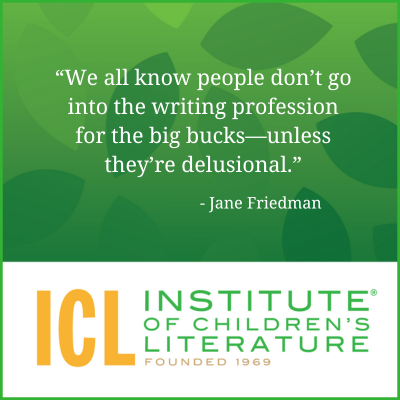
5 Ways Writers Can Prep for 2025 Goal Setting
Before we roll on to the new writing year, let’s harness our optimism for the blank slate before us and prepare for our 2025 Goal Setting just for writers.

In most professions, frank talk about money rarely happens, and writing is no exception. Part of the problem is that it’s difficult to make blanket statements about how much a writer can expect to get paid. For example, I’ve written passages for testing companies and been paid around $150 for a passage and then, for a different company, been paid around a thousand dollars for the same number of words.

Many trade publishers pay both advances (a kind of upfront money) and royalties (money that is a percentage of the money made from selling the books.). An advance is not a loan, not in the typical sense. Let’s talk for a moment about what an advance is and how it’s calculated.
For most trade publishers, an advance is money paid ahead of publication that equals the amount the publisher expects to pay out in royalties. So if the publisher guesses right, you have the advance, but you don’t really make any more money beyond that. If the publisher guesses wrong but guessed too high, then you don’t ever get royalties, but you also don’t have to pay any of that advance back. The advance is not a loan in that sense. But if the books sell more copies than the publisher expected, your advance will “earn out” and you’ll begin collecting royalties.
Now, having said that, if the book is canceled due to something you did, then you may be required to pay back your advance. But read your contract carefully so that you know exactly what circumstances can trigger that and you can be sure it doesn’t happen to you.
This is another myth that simply isn’t true. Because publishers expect your royalties to equal your advance, the publisher actually begins making a profit on your book long before you earn out. So not earning out means your book probably performed exactly as the publisher expected, or maybe slightly worse. It doesn’t mean it was a flop, and it doesn’t mean you won’t be able to sell another book.
Now if your publisher got in a bidding war over your book because several publishers expected your book to be a hot item, and thus you ended up with an unexpectedly high advance, and the book falls far short of the expected sales, that can be discouraging for that publisher when it comes time to buy another book from you. But in a normal situation, that doesn’t happen and isn’t a problem. And if you do run into a bidding war, be aware that huge advances are great right now, but the publisher is gambling on something you can’t do much about, so they can also be worrisome.
Most writers, even those with books that end up selling a lot, are not going to get rich. And by most, I mean nearly all. It’s not impossible that a book could become a runaway bestseller, but it’s profoundly unlikely, especially these days when there are so many books competing for readers.

This is especially true of picture books. Because picture books are expensive to illustrate, picture book writers get far, FAR less money in advances than novelists. It’s not unusual for a picture book author to be offered an advance of $2000 or less (sometimes a lot less) and never see any more money. Still, one of the nice things about children’s writing is that popular books tend to stay in publication for a long time and bring in royalties for years as new children come along and fall in love with the book.
Keep in mind that for every Good Night, Moon or Where the Wild Things Are, thousands of books come and go with little attention. Writers need to be ready to work for the long run. The longer you stay in the business, the more books you write, and the more you hone your craft and improve, the better chance you’ll make a living from writing someday.
Most writers of adult novels have a second job to pay the bills. Over time, some may make enough money to let their “day job” go and lean on writing, but the majority will only be able to write part-time. For children’s writers, the amount made per book tends to be lower, so day jobs are even more necessary.
For years, the primary income source for most popular children’s writers was school visits. This has been more difficult in the last few years, both because Covid put a stop to all school visits, and because schools are still recovering from the ill effects of the pandemic. Some schools are booking school visits again, but some writers are finding it difficult to get the rates and numbers they had in the past. We’re in a time of transition right now, and it’s hard to predict exactly how it’s going to end up.
Not all writing myths are about money coming in. There are also myths about money going out. I’ve heard writers say they couldn’t afford to be published, and when I asked them about what they meant, they talked about the cost of paying for illustrations, or the cost of vanity press fees, or the cost of hiring a literary agent, or the cost of hiring a publicist. None of those things should cost a writer anything. A writer with only one book should probably not invest in a publicist. Publicists are a better bet for writers further in their careers who need someone to handle things like public appearances and signings. In the beginning, you won’t make enough from that to make a publicist anything but a waste of money.

Agents are another place where writers do not spend money. A good, respectable agent doesn’t get “paid” directly by the writer. Instead, the agent is taking a risk in terms of time and money so that the agent can get the writer the best possible publishing deal. Then the agent gets a cut of that deal when the publisher pays the writer. If the agent can’t sell your book, the agent doesn’t get paid. This means agents are strongly motivated to sell your book. You don’t want to weaken the motivation by giving the agent money directly.
That doesn’t mean there aren’t people out there who are eager to separate writers from their money. This can take the form of convincing a writer that it’s normal to be required to buy a bunch of your own books or other books by the publisher, or that it’s normal for the writer to “share” the costs of publishing. Or it can take the form of “agents” who come up with all kinds of fees for their work ahead of the sale. This isn’t normal. And do you really want to work with a company that intends to make its money from you rather than from selling your book? Most businesses are motivated by money, be sure the motivation of your agent and your publisher pushes the person in a direction that will do the most possible for your book and your career.
It is incredibly rare for you to make much money from writing for quite a while. Because of this, it will help you get through the process if you base your motivation on something other than money.
Write because writing is what you do, and a deep part of who you are.
Write because you have things to say.
Write because you find joy in the journey.
Do those things and mix in a dollop of determination and several pinches of patience, and money may follow. Keep learning through the process, and the money will get better over time. But hold onto the motivation based on what’s in you, and you’ll find success.
With over 100 books in publication, Jan Fields writes both chapter books for children and mystery novels for adults. She’s also known for a variety of experiences teaching writing, from one session SCBWI events to lengthier Highlights Foundation workshops to these blog posts for the Institute of Children’s Literature. As a former ICL instructor, Jan enjoys equipping writers for success in whatever way she can.

Before we roll on to the new writing year, let’s harness our optimism for the blank slate before us and prepare for our 2025 Goal Setting just for writers.

Writers can be thin-skinned when it comes to getting feedback on their work. Let’s look at 4 ways to positively deal with constructive criticism!

Rejection is part of the territory when it comes to being a writer. Today we offer reflection for writers to help redirect your efforts after a rejection.
1000 N. West Street #1200, Wilmington, DE 19801
© 2024 Direct Learning Systems, Inc. All rights reserved.
1000 N. West Street #1200, Wilmington, DE 19801
© 2024 Direct Learning Systems, Inc. All rights reserved.
1000 N. West Street #1200, Wilmington, DE 19801
© 2024 Direct Learning Systems, Inc. All rights reserved.
1000 N. West Street #1200, Wilmington, DE 19801
© 2025 Direct Learning Systems, Inc. All rights reserved.
1000 N. West Street #1200, Wilmington, DE 19801
©2025 Direct Learning Systems, Inc. All rights reserved. Privacy Policy.